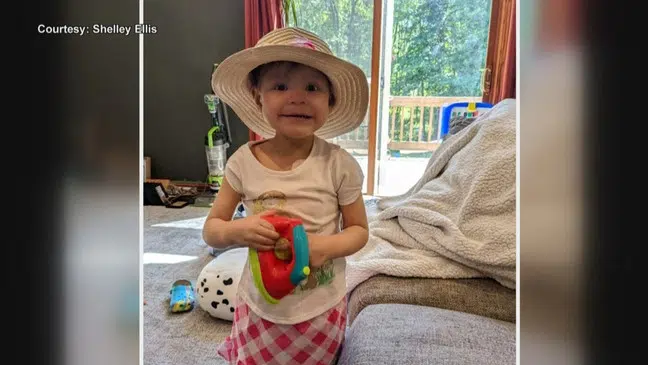
Vega Ellis, 2, passed away after a battle with Acute Myeloid Leukemia. PC: Fox 11 Online
TOWN OF PESHTIGO, WI (WTAQ-WLUK) — PFAS – it’s often called the “forever chemical.” It’s a chemical compound left over from manufacturing that is creeping into water systems around the country, including rivers and wells right here in Northeast Wisconsin.
While PFAS has been linked to certain cancers in adults, research is being done to find out whether PFAS exposure can lead to an increase of pediatric cancer cases.
This is of particular interest to a group of mothers in the town of Peshtigo.
The Wisconsin Department of Natural Resources has said PFAS has been detected in about 80 percent of private drinking wells sampled in the area.
“You look any direction and you know somebody with cancer,” said Shelley Ellis of the town of Peshtigo.
The Wisconsin Department of Natural Resources says the toxic group of chemicals has been found at high levels in Marinette and Peshtigo area soil, groundwater, surface water, biosolids, and private drinking water wells.
While various health studies, including from the International Agency for Research on Cancer, have connected PFAS exposure to some cancers, Shelley Ellis wants to specifically know if there’s a link to childhood cancer. She lost her daughter Vega last year after a 1 1/2-year battle with acute myeloid leukemia.
“The doctors say ‘we don’t know, it’s just something that happens,’” said Ellis. “That was never a good enough answer for me.”
Since Vega’s diagnosis, her mother has learned of three other children in the Town of Peshtigo who’ve been diagnosed with cancer.
“When you have a small town of 3,000 people and four kids diagnosed with cancer, you know there is something more than just an ‘unlucky situation’ or ‘it just happens’,” said Ellis.
Elizabeth Goodsitt, a Wisconsin Department of Health Services spokesperson said in an email, “We recently received this cancer concern inquiry from a group of parents who were concerned about childhood cancer in Peshtigo. We have worked with concerned residents to collect preliminary data and are gathering additional information from the Wisconsin Cancer Registry to further investigate.”
“Where I was living when I was pregnant with her (Vega), there is a big plume of PFAS right underneath of where we were living,” said Ellis.
Ellis says the home was within the DNR’s investigation area for PFAS contamination, but the water source was a public supply.
Mya Maye has Acute lymphoblastic leukemia. Her mother, Heidi, says their family lives just outside the DNR’s PFAS investigation area. They have a private drinking water well, but instead of paying $600 to have it tested for PFAS, the family purchased a water filtration system.
Jameson Wortner is fighting neuroblastoma. His mother, Jordan, says they lived at a home within the DNR investigation area, which had a private well with elevated levels of PFAS.
At the center of the DNR’s investigation area is a Johnson Controls and Tyco Fire Products testing center. The company has admitted to some PFAS contamination from testing firefighting foam between the early 1960s and 2017.
A University of Wisconsin study published earlier this year linked PFAS contamination in the area only to the testing center.
The DHS spokesperson said PFAS is not currently known to be associated with any childhood cancers, but this potential link is being studied by the National Cancer Institute.
“I think it’s going to take some time, but doing anything big or small is going to help,” said Ellis.
Goodsitt says PFAS is known to be associated with increased risk of kidney cancer in adults and may be associated with breast and testicular cancer in adults as well.
“What we went through was a very hard thing,” said Brittany Ellis, Shelley’s sister and Vega’s aunt. “If people don’t bring this to attention, nothing is ever going to come of this.”
While the Ellis sisters wait for experts to research the subject, they are taking on a familiar topic: helping those affected by cancer.
“We received so much support during Vega’s fight,” said Shelley Ellis. “We were able to be down in the hospital with her for a year, just on the generosity and support from our community.”
“Vega is still touching people’s lives,” sad Brittany Ellis. “We still see that support and we’re really just hoping to push that support onto the other families that really need it right now as well.”
The Ellis sisters are hoping to continue to reciprocate the generosity, while waiting for answers to the many PFAS-related questions they have.



Comments